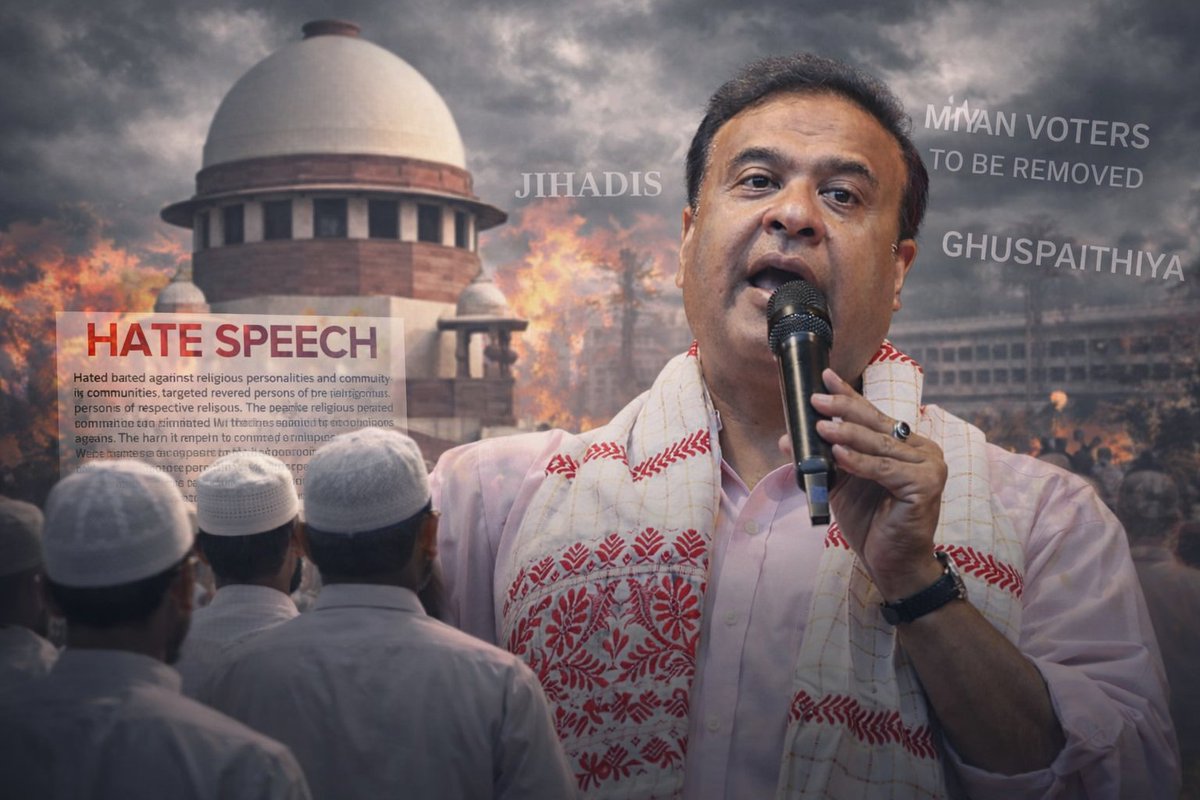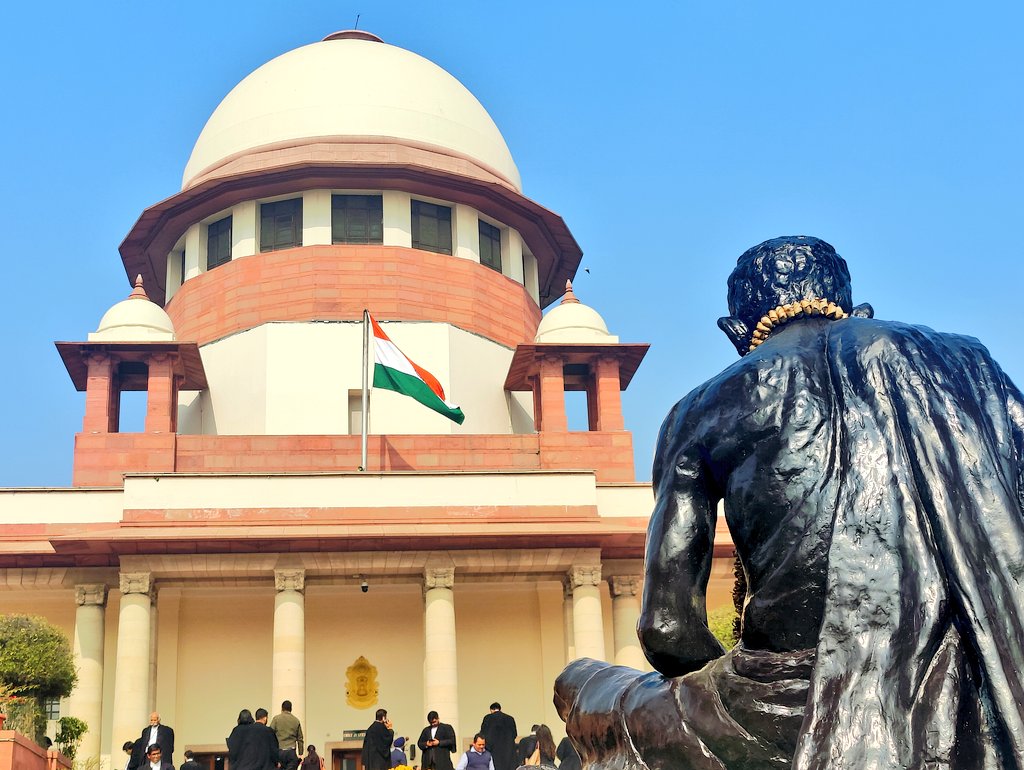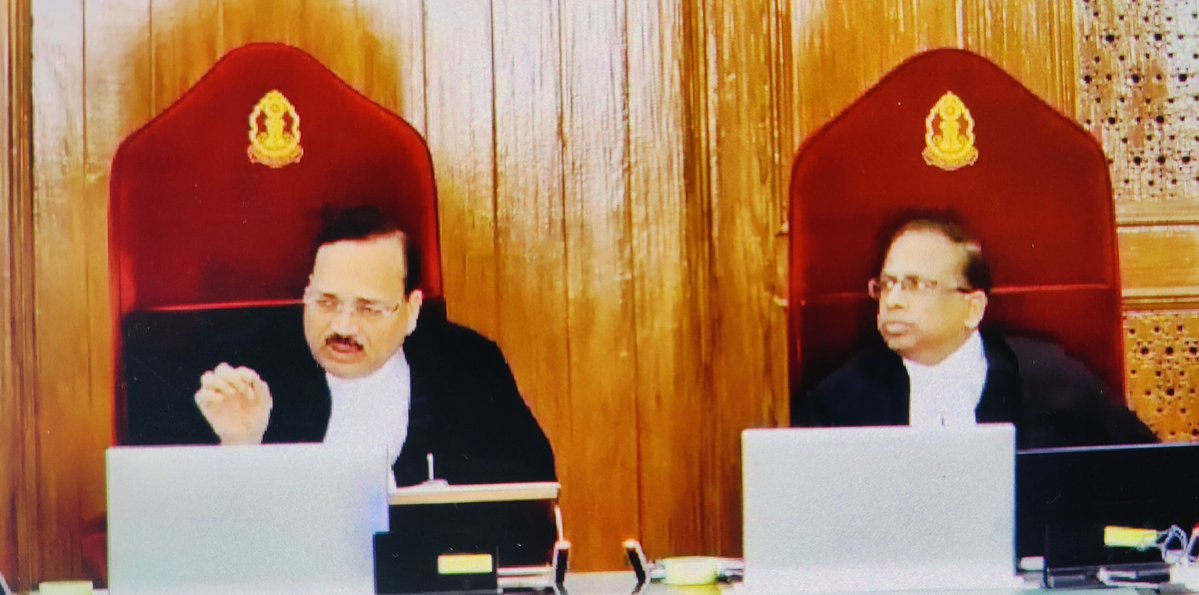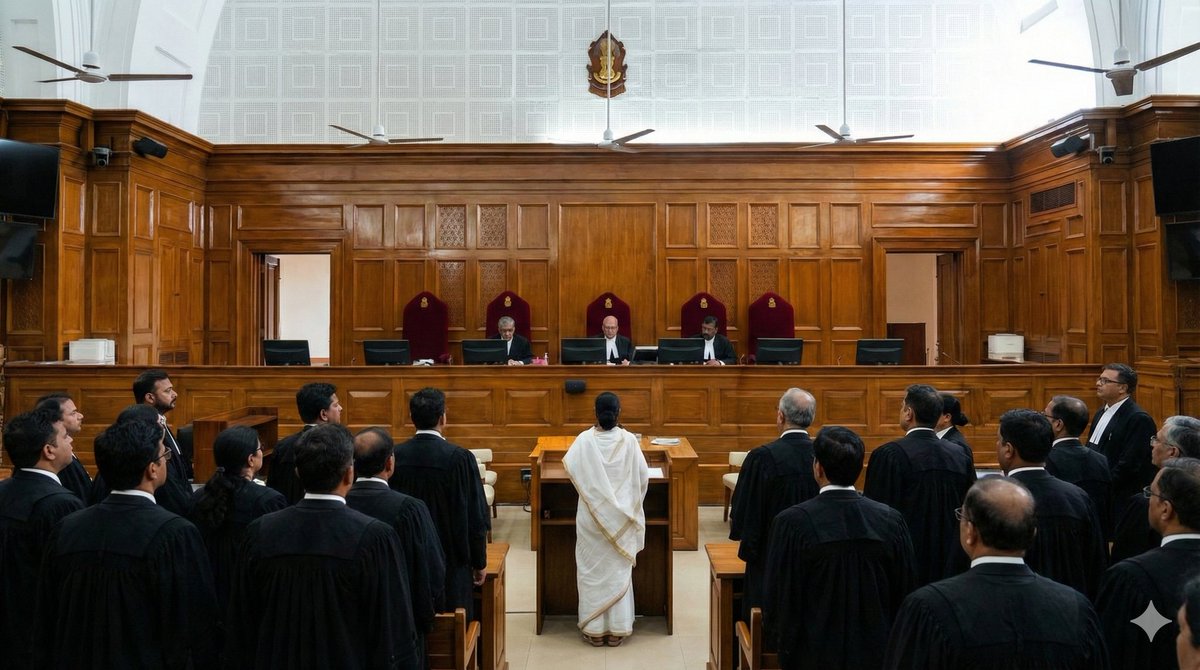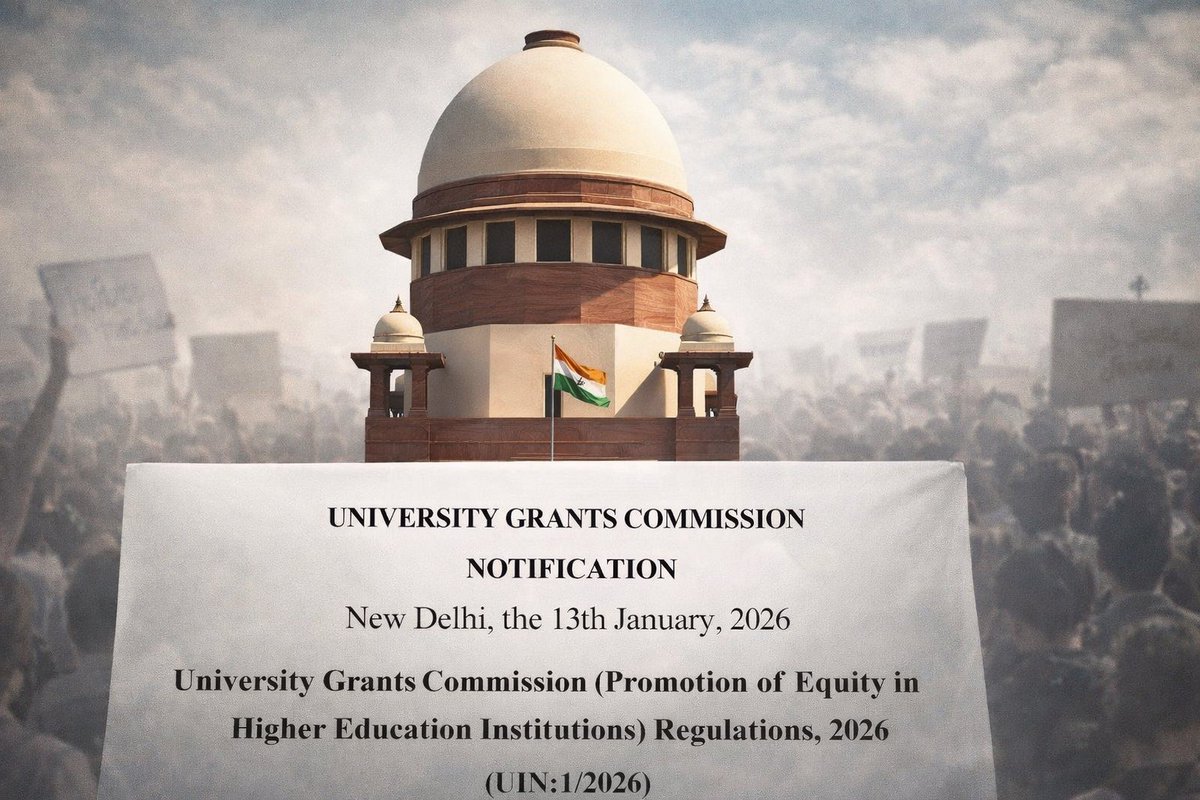CHALLENGE TO TRIBUNAL RULES, 2020:
Supreme Court Bench headed by Justice L Nageswara Rao resumes its hearing on petition filed by Madras Bar Association (MBA) assailing the Tribunal Rules of 2020.
#SupremeCourt #TribunalRules2020
Supreme Court Bench headed by Justice L Nageswara Rao resumes its hearing on petition filed by Madras Bar Association (MBA) assailing the Tribunal Rules of 2020.
#SupremeCourt #TribunalRules2020

AG KK Venugopal at the outset says that he will require about 1.5 hours after rejoinder submissions made by petitioners are over as large number of issues are raised and need to be addressed
SC requests all Counsel to keep arguments short and to the point
#SupremeCourt
SC requests all Counsel to keep arguments short and to the point
#SupremeCourt
Senior Counsel Arvind Datar resumes making his submissions.
Datar notes that he has sufficiently made his submissions on the issue of four year tenure.
#SupremeCourt #TribunalRules
Datar notes that he has sufficiently made his submissions on the issue of four year tenure.
#SupremeCourt #TribunalRules
Datar: Statutes note that the age for Vice Chairman is fixed at 67. Because most of them come from HC.
(Cites NGT Act as example)
But one non obstante clause in the Rules makes the age of Vice Chairman as 65.
(Cites NGT Act as example)
But one non obstante clause in the Rules makes the age of Vice Chairman as 65.
Datar: Rule 4(2) has to be completely struck down. It is incompatible with the principles of Judicial independence.
(Rule 4(2) deals with the Presiding head of the Search and Selection Committee for appointment at Tribunals)
#SupremeCourt #TribunalRules
(Rule 4(2) deals with the Presiding head of the Search and Selection Committee for appointment at Tribunals)
#SupremeCourt #TribunalRules
Datar: Once the committee selects the candidates, appointments cannot be kept pending indefinitely and there has to be a upper limit within which the appointment should be made.
Even now, there are some selections that were made in October 2019 but apointment still not made.
Even now, there are some selections that were made in October 2019 but apointment still not made.
(Datar now refers to the Rule which gives the casting vote to the head of the Search cum Selection Committee and not the Judge of the SC)
Datar: Judicial dominance has to be there.
#SupremeCourt #TribunalRules
Datar: Judicial dominance has to be there.
#SupremeCourt #TribunalRules
Datar (On reappointment): The precedents (2nd MBA judgment and Rojer Mathew) make it abundantly clear that any type of reappointment is not permissible as it is likely to compromise thr judicial independence of the member who is to interview again for appointment.
(Datar says that S.184 of the Finance Act does not provide for restrospective effect to the Rules as opposed to GST Act where a specific provision for such retrospective effect is made.)
Datar: If the Rules are upheld then they should not be given retrospective effect for practical difficulties and the Rules should be prospective and not affect any of those appointed prior to coming into force of these Rules.
#SupremeCourt #TribunalRules
#SupremeCourt #TribunalRules
Datar: 9 out of 19 Tribunals require for the Chairperson to be a retired SC Judge.
It is my humble submission that it is impermissible under our Constitution for a retired SC Judge to go for an interview before a committee headed by a secretary of the concerned Ministry.
It is my humble submission that it is impermissible under our Constitution for a retired SC Judge to go for an interview before a committee headed by a secretary of the concerned Ministry.
(Datar is taking the Court through the upper age limit for members for various Tribunals as it stands currently in the wake of the Rojer Mathew judgement through which the 2017 Rules were struck down)
Datar: After the 2017 Rules were quashed, the interim order said that the appointments, tenure etc would be governed by the parent Statutes.
For example, for NGT the retirement age would be 67 years of age or five years term.
For example, for NGT the retirement age would be 67 years of age or five years term.
Datar: The biggest difficulty in having all India Tribunals is housing.
I'm told that many people who were offered the post at Tribunals did not take it due to housing.
We can make the best Rules but the issue of housing needs to be seen.
I'm told that many people who were offered the post at Tribunals did not take it due to housing.
We can make the best Rules but the issue of housing needs to be seen.
Datar: Rule 15 of 2020 Rules, it doesn't provide for housing, they are given HRA.
Justice Hemant Gupta: In competition commission, they are not given housing or HRA but they are given substantial consideration. Why can't that be done for the members of Tribunals?
Justice Hemant Gupta: In competition commission, they are not given housing or HRA but they are given substantial consideration. Why can't that be done for the members of Tribunals?
(Datar highlights the practical difficulties in this option especially in cities like Mumbai, Delhi, Chennai etc.
Datar: The government can give monetary compensation but is a retired SC Judge expected to hunt for houses for a Tribunal posting?
#SupremeCourt
Datar: The government can give monetary compensation but is a retired SC Judge expected to hunt for houses for a Tribunal posting?
#SupremeCourt
Datar: First Judges case, SC said that finding houses all over India (to deal with housing issues) is not difficult and had directed for finding the houses for Judges.
And all the members of all Tribunals out together may not be more than 500.
And all the members of all Tribunals out together may not be more than 500.
Datar: So my humble submission is that please strike down the rules.
And make some observations on the issue of housing.
(Datar concludes. SC asks Datar to give a written note if needed)
And make some observations on the issue of housing.
(Datar concludes. SC asks Datar to give a written note if needed)
(AG KK Venugopal begins his submissions now)
AG: S.184 of Finance Act was challenged and was upheld in its entirety.
AG: Four years' term should be enough for assessing if the member is eligible to be reappointment or not. In four years you can see if he was delivering or not, was he a person of integrity etc.
All this need to be looked into for reappointment.
All this need to be looked into for reappointment.
AG: Therefore, submission that tenure should be 5 years is not justified.
(AG reads from the Rojer Mathew judgment)
AG: There has been a conscious effort to make sure that no person appointed under the Acts or Rules is denied of any of the benefits so any submission contrary to this is not justified.
AG: There has been a conscious effort to make sure that no person appointed under the Acts or Rules is denied of any of the benefits so any submission contrary to this is not justified.
AG: Tribunals are usually manned by retired Judges. They use the prefix "Justice" and lawyers when practising before Tribunals address those Presidents as "My Lords" because they are probably afraid that the retired Judge may not be happy if not addressed as such.
(Counsel and Bench have a discussion on the way Judges are addressed hy lawyers in lighter vein)
Justice L Nageswara Rao: Mr. Attorney sometimes some of us insist on not being addressed as My Lords. One such Judge is before you (referring to Justice S Ravindra Bhat)
Justice L Nageswara Rao: Mr. Attorney sometimes some of us insist on not being addressed as My Lords. One such Judge is before you (referring to Justice S Ravindra Bhat)
Senior Counsel CS Vaidyanathan: Justice Bhat and Justice Muralidhar both while at Delhi High Court had said not to be addressed as "My Lord"
Justice Ravindra Bhat: In fact there was a full court order on this in Rajasthan HC last year.
AG: I think "Sir" would be best.
Justice Gupta: There is a joke that sometimes if you take away "My Lord" then there is hardly anything left in an argument.
(All laugh)
AG: I think "Sir" would be best.
Justice Gupta: There is a joke that sometimes if you take away "My Lord" then there is hardly anything left in an argument.
(All laugh)
(AG continues with his submissions)
AG (On the date of operation of Rules): Section 183 of the Finance Act says that Rules made under S.184 shall apply to the members appointed.
AG (On the date of operation of Rules): Section 183 of the Finance Act says that Rules made under S.184 shall apply to the members appointed.
AG: S.157 says that the date of appointment would be the date notified in the gazette.
The result of that is under S.183, rules made under S.184 would be in force starting from the date of notification.
You cannot make Rules Restrospective by making a rule to that effect.
The result of that is under S.183, rules made under S.184 would be in force starting from the date of notification.
You cannot make Rules Restrospective by making a rule to that effect.
AG: In present situation, judgement was delivered in November 2019 and the 2017 Rules were struck down in entirety. Therefore there was a vacuum and to fill this vacuum, the interim order was passed which reverted to the Parent Acts for appointments and terms of appointments.
AG: It was said on making new Rules, if I want modification, I can come to Court again.
Through S.183, the Rules made under S.184 become applicable.
Result is, those appointed before 26th May, 2017, they will continue and won't be disturbed.
Through S.183, the Rules made under S.184 become applicable.
Result is, those appointed before 26th May, 2017, they will continue and won't be disturbed.
AG: Persons appointed under the 2017 Rules will continue to have the benefits...
Justice Bhat: There may be a flip side. We don't know how many of these are there because not everyone is before us.
AG: I'm told there are 144 or 145.
Justice Bhat: There may be a flip side. We don't know how many of these are there because not everyone is before us.
AG: I'm told there are 144 or 145.
Justice Rao: What would be the position with respect to the persons who were appointed in terms with the interim order?
AG: These appointments would be subject to the outcome of the writ.
Datar: With great respect, orders do not say that.
Vaidyanathan: My order says so
AG: These appointments would be subject to the outcome of the writ.
Datar: With great respect, orders do not say that.
Vaidyanathan: My order says so
(AG refers to appointment order of one Rachana Gupta who was appointed as a judicial member of one of the Appellate Tribunals.
Order specified that appointment was subject to outcome of WP which challenged 2017 Rules)
AG: I believe all appointment orders would say this.
Order specified that appointment was subject to outcome of WP which challenged 2017 Rules)
AG: I believe all appointment orders would say this.
AG: All appointments made prior to 26/5/2017 would be governed by parents Acts.
2017 Rules came into force from 26/5/2017 and apointments were made. Additional benefits under Rules under Finance Act 2017 shall not be withdrawn from those appointed under struck down Rules.
2017 Rules came into force from 26/5/2017 and apointments were made. Additional benefits under Rules under Finance Act 2017 shall not be withdrawn from those appointed under struck down Rules.
AG: The entire purpose of tbe Finance Act was to amalgamate and bring uniformity in terms fo appointments to all the Tribunals.
AG: The 2020 Rules would come into force and fill up the void but the better salaries and emoluments under 2017 Rules would continue.
AG (On ILS members as judicial members): They have 13 years as Advocates before they are appointed as ILS members. So they are advocates and have additional legal experience. They become equivalent of secretary, which takes 20 years...
Justice Rao: Do you want them to be considered as judicial members?
(AG answers in the affirmative)
Justice Rao: But two Constitution Benches say we can't do it.
(AG refers to the judgment in SP Sampat Kumar case)
(AG answers in the affirmative)
Justice Rao: But two Constitution Benches say we can't do it.
(AG refers to the judgment in SP Sampat Kumar case)
AG: Subsequent judgements with just one sentence that ILS members will be considered only for administrative members cannot hold good.
With great respect, this Judgment in Sampat Kumar would hold good
With great respect, this Judgment in Sampat Kumar would hold good
Hearing for the day concludes.
The matter will be taken up later when the Bench on this combination is available again.
#SupremeCourt #TribunalRules
The matter will be taken up later when the Bench on this combination is available again.
#SupremeCourt #TribunalRules
Plea challenging Tribunal Rules 2020: LIVE UPDATES from Supreme Court
barandbench.com/news/litigatio…
barandbench.com/news/litigatio…
• • •
Missing some Tweet in this thread? You can try to
force a refresh


